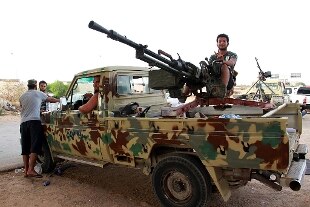Share
by Leonardo Sgura 10 May 2020 Violent armed clashes continue around Tripoli, Ain Zara, Al Mashroa, Salah al Din and Abu Salim. Four people, including a child, died from the attack with more than 80 rockets on Mitiga airport. In the last three days there are about twenty civilian victims of the violent bombings of Haftar against peripheral neighborhoods of the capital, including the area where the Italian embassy is located, touched by a rocket that fell a few tens of meters.While the world's attention is absorbed by the coronavirus emergency, the Libyan conflict is escalating again. "It is a crazy strategy - says the president of the National Agreement Government, Fayez Al Serraji - which reveals the weakness of Haftar, whose plan to seize power has come to an end".
It is a fact that the GNA army, recognized by the UN, in recent weeks has managed to consolidate the defenses of Tripoli, regaining control of important territories lost during the twelve months of siege of the capital by the LNA.
Al Serraji's men reconquered Sorman, Sabratha and other smaller centers west of the capital, and are now pressing on the Watyiah airbase, a location relevant to the self-proclaimed Libyan National Army, which so far would have lost 70 men to resist the attack.
Government forces have been targeting Trahuna with drones for days, a city in the hands of allied tribes of Cyrenaica; operation to which Haftar is responding with the new wave of bombings against Tripoli, in particular on the Mitiga airport, used for civil flights but also for military operations, in particular Turkish supplies.
After Ankara's direct intervention in the conflict, decided in January, the power relations that indicated Haftar one step away from victory have changed. Erdogan in fact responded to Al Serraji's request for help, which has the Muslim Brotherhood as its main allies, sending drones, high-tech defense systems, armored vehicles, specialized personnel and thousands of militiamen already used in the conflict along the Syrian border.
It is an alliance that has strongly influenced the Berlin peace conference, closed at the end of January without the signing of the two opponents, and the truce signed a few days earlier in Moscow thwarted. Haftar has in fact attempted to thwart Ankara's intervention, intensifying attacks against logistical installations; but Tripoli, after strengthening, went on to the counter-offensive.
The UN and the European Union condemn military escalation and deplore, as they have been doing for months now, the involvement of civilian victims in the conflict.
In these days, the Irini mission, decided by Brussels, on the basis of the Berlin agreements, to monitor the arms embargo becomes operational. In command will alternate Greece and Italy, which has responsibility for the first period with Admiral Fabio Agostini. But Tripoli does not like the mission, especially maritime, which accuses Europe of favoring in this way the army of Cyrenaica, which would continue to receive the aid of its allies by land and air (Arab Emirates, Egypt, Saudi Arabia and, less explicitly, Russia and France), while for the Turks it will be difficult to continue supplying the GNA by sea. Malta thinks the same way, and announces that it is slipping away from the mission.
The next few weeks will therefore be crucial. If Irini works, it could affect the path of peace for which international diplomacies have been working for months.
In the meantime, however, Libya remains on the brink of the abyss: so far the conflict has caused more than 1700 deaths, 17 thousand injured and over 200 thousand displaced. The coasts remain out of control, the preserve of human trafficking organizations between Africa and Europe.
And from 17 January all the oil plants in the country are paralyzed: the tribes loyal to Haftar, asking for a fair distribution of profits, continue to block the main Libyan economic resource, with damages that so far amount to 4.3 billion dollars.

